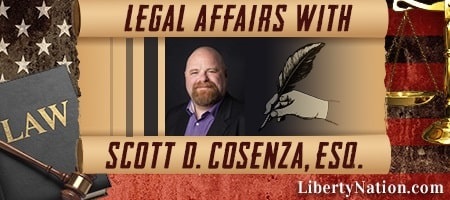Has New York Judge Arthur Engoron violated Donald Trump’s civil rights by withdrawing permission for the former president to make a closing argument at his civil fraud trial? Is this par for the course in American jurisprudence?
We spoke with Liberty Nation Legal Affairs Editor Scott D. Cosenza, Esq., to sift fact from fiction and freedom from formality.
 Mark Angelides: Scott, this trial has been brought by New York Attorney General Letitia James as part of her efforts to “get Trump,” something she campaigned on. The argument is that Trump engaged in fraud and should be fined hundreds of millions of dollars and barred from operating businesses in New York. Essentially, his livelihood is on the line, and he’s not allowed to speak about it? Is this normal – even after the judge initially granted permission?
Mark Angelides: Scott, this trial has been brought by New York Attorney General Letitia James as part of her efforts to “get Trump,” something she campaigned on. The argument is that Trump engaged in fraud and should be fined hundreds of millions of dollars and barred from operating businesses in New York. Essentially, his livelihood is on the line, and he’s not allowed to speak about it? Is this normal – even after the judge initially granted permission?
Scott D. Cosenza: Nothing is normal when Trump is involved. That caveat should inform all of our consumption of stories regarding him. That said, it’s not “normal” for civil trial defendants to deliver legal arguments. If defendants represent themselves – which is called pro se – they would be expected to make closing arguments. But if they hire an attorney, like Trump did, to fight a month-long trial, no. That’s what the lawyer is there for.
No Jury to Taint in Trump Trial
MA: Looking at the broader picture, this is a non-jury trial, and Judge Engoron has already declared Trump guilty. So him speaking in court wouldn’t have been swaying a jury, but rather putting on the record, to the judge’s face, Trump’s opinion and defense – for posterity. To deny him that – especially as it would impact only the judge – seems a petty smite.
SDC: It’s a vital distinction in analyzing Engoron’s decision – no jury in this case. A big part of what judges do at trial is control the information flow to juries. The rules of evidence allow only specific presentations to juries, and making sure those rules are followed requires significant attention from the bench. The rules exist to prevent jurors from hearing inadmissible evidence with which to render a judgment – a nonexistent risk in this case. Judge Engoron need not be insulated from Trump’s words should they run afoul of permitted arguments.
The Golden Rule
MA: I think that – even though it is pro forma not to make a closing speech – many folks would consider it an affront to the rules of fair play if they do not get to put in their final word. In ancient Rome, more than 2,000 years ago, anyone on trial was granted the ability to have a say. I’m sure that many folks think Trump should be able to say what he wishes rather than sit silently while others cast judgment upon him.
SDC: It’s a sad irony that while so many officials and systems have been bent beyond breaking to accommodate “get Trump” initiatives, others still operate normally. Judges and prosecutors have an ocean of discretion and power in our judicial system. When they rule less like philosopher kings and more like local ward heelers, we see the weakness of such a setup. So, while I think this judge has shown a deep and abiding bias against Trump, some of his treatment is simply par for the course for being in the government’s crosshairs. One silver lining is that people seeing the J6 prosecutions and this civil trial and other Trump cases realize our system is not fundamentally fair to or robustly protective of the accused. It’s rather more like a casino – everything is tilted to favor the house.




